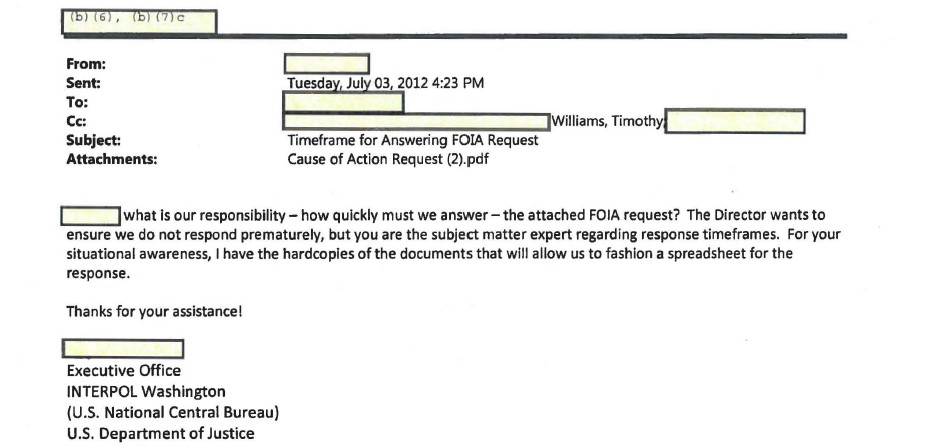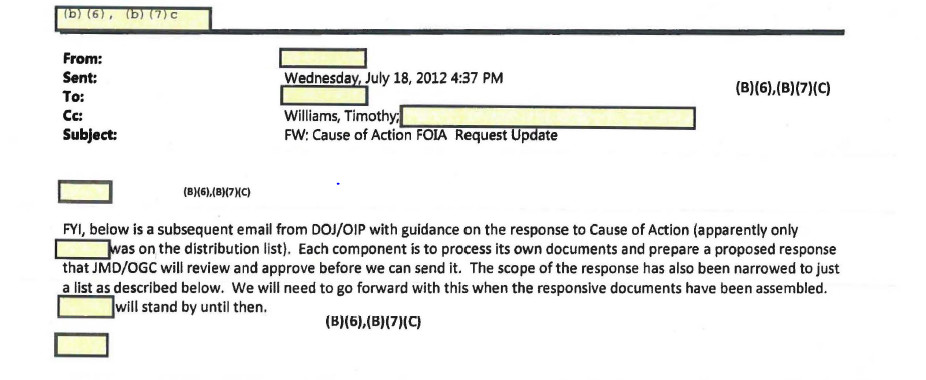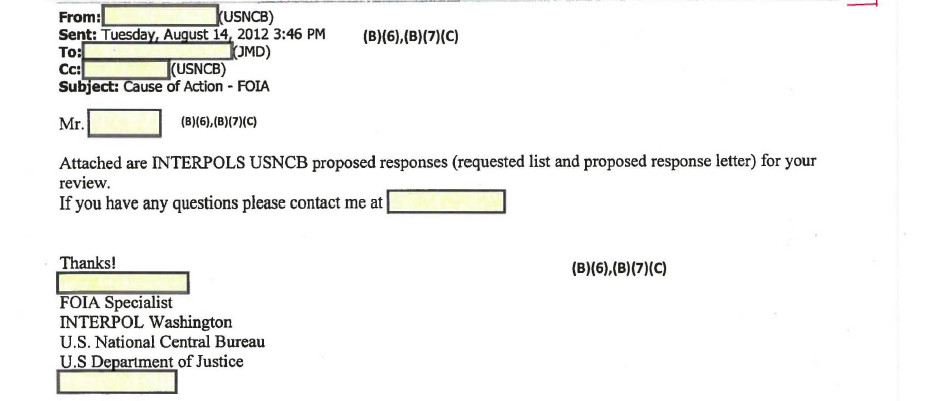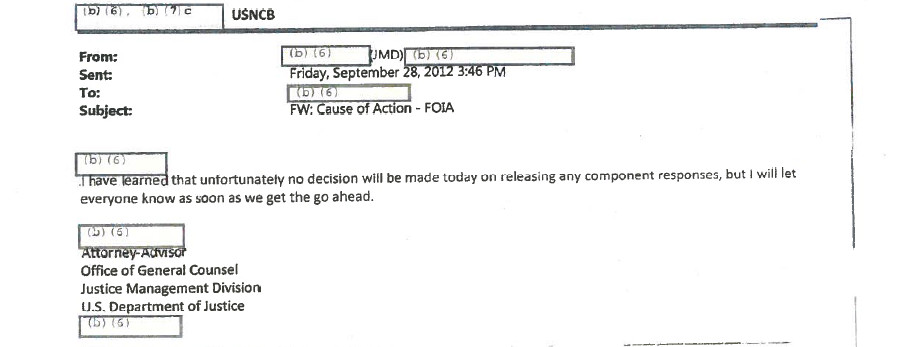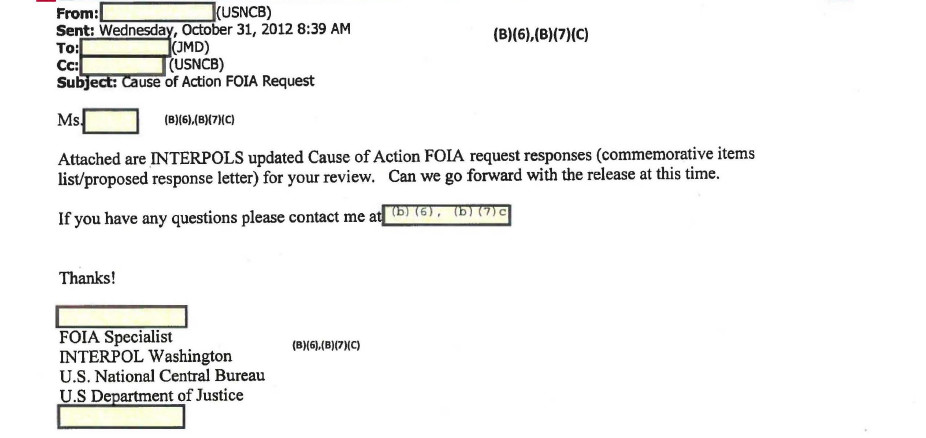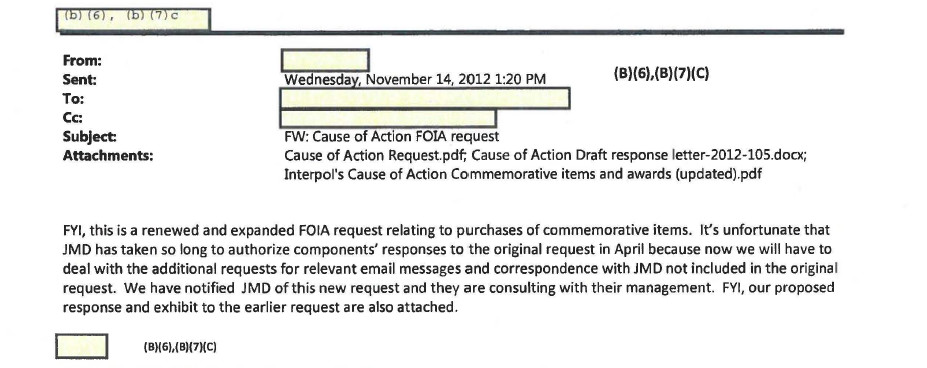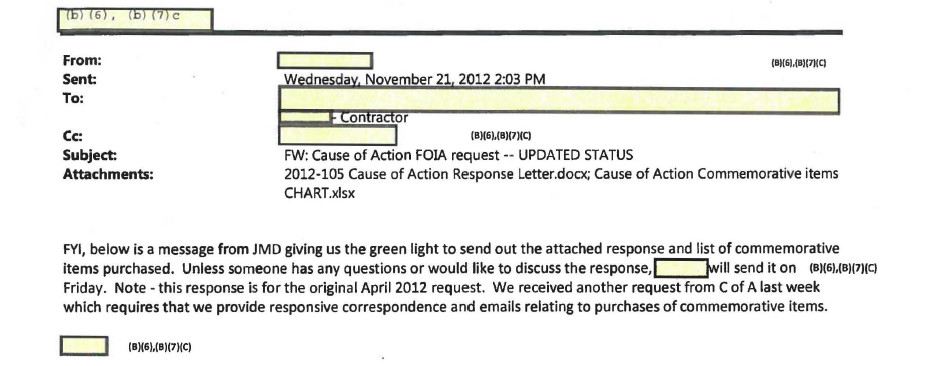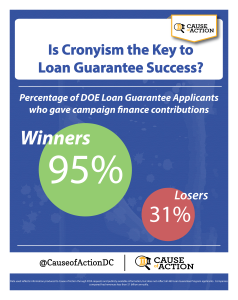Executive Director Dan Epstein discusses CPPW report on WFLA
Archives for April 2013
FOIA Freak-Out: DOJ Scrambles to Avoid Fallout Over Swag Purchases
When news of the General Service Administration’s (GSA) Las Vegas blowout broke in April 2012, Cause of Action was as appalled as anyone at the reckless waste of taxpayer dollars. But instead of focusing on mind readers and ritzy sushi receptions, we zeroed in on the unconscionable amount the GSA spent on baubles and trinkets commemorating the conference. Knowing that this kind of spending is all-too-common in the federal government, Cause of Action sent Freedom of Information Act (FOIA) requests to each government agency for all documents related to purchases of commemorative and promotional items over a three-year period.
While some agencies responded relatively quickly, others delayed production for weeks or even months. The Department of Justice (DOJ), in particular, took so long to produce documents that Cause of Action began to suspect the agency of deliberately dragging its feet. In November 2012 we sent another FOIA request to DOJ Interpol, this time asking for any communications regarding our original request sent seven months previously. When we finally received the documents, largely e-mail communications, in late January of this year, they revealed a department in the midst of a FOIA freak-out.
Check out this excerpt from notes taken during a DOJ Executive Officer’s meeting last May:
We’re flattered that DOJ bigwigs felt compelled to discuss Cause of Action’s request along with such important items as the Department’s budget and new management structure, but all that attention shouldn’t be necessary for a routine FOIA request. And what did they mean by commanding components to “stand down?” If they instructed employees already answering requests from FOX News and Bloomberg to stop their work and instead focus their efforts on Cause of Action’s request, that’s a major violation of the agency’s statutory obligations. FOIA regulations dictate that requests be addressed in the order they are received, not the order of their potential to embarrass the agency.
Then there’s this e-mail from DOJ Interpol’s Executive Office:
Call us old-fashioned, but Cause of Action believes agencies should follow the plain language of the law. And the plain language of the Freedom of Information Act states that agencies have 20 business days to respond to a request, even if only on an interim basis. That’s their “responsibility.” When a Director worries about “responding prematurely” after the Department has already sat on a request for three months, one has to wonder about that person’s motive. Is it to ensure that no stone is left unturned in the pursuit of relevant documents? Or is it to prevent damaging coverage of the department’s wasteful spending until the GSA conference scandal recedes from the public consciousness?
Perhaps the next few e-mails can shed some light on this question:
So, Justice Management Division (JMD) was tasked with reviewing all components’ responses before sending them on to Cause of Action. A little unorthodox, perhaps, but not unprecedented in our own experiences with federal FOIA procedures.
By August, DOJ Interpol had completed its document production:
After submitting it’s response to JMD, Interpol waited…and waited…
More than three months after submitting its production, Interpol finally received the long-awaited go-ahead:
In a stunning coincidence, JMD completed its review just one week after Interpol received our second FOIA request for communications regarding our original request. Funny how these things work out.
Although Cause of Action is still waiting on answers from a few more components, the documents we’ve received so far indicate that between January 2009 and June 2012, DOJ spent over $1 million on plaques, lapel pins, commemorative coins, and a whole slew of other trinkets for DOJ employees and contractors. The worst offender by far was JMD itself; in 2009 it spent $80,245 on awards alone for just one event, the Annual Attorney General’s Award Ceremony. In 2010 and 2011, as the rest of the Department scaled back costs in the face of a budget backlash, spending on swag for the Ceremony actually increased, to $160,137 and $172,845, respectively. When one DOJ component spends nearly half a million dollars on awards for three events in as many years, it’s clear that the GSA isn’t the only agency struggling with excessive and irresponsible spending practices.
Cause of Action believes that despite the attempts at transparency by some FOIA officers, Department of Justice leadership deliberately delayed our request rather than provide details on the embarrassing amount the agency spent on swag and trinkets. The high-level meetings, the fear of “responding prematurely,” the delays for a straightforward request; all this points to an agency hypersensitive to any and all reproach, obsessed with protecting its reputation at the expense of accountability and transparency. Rather than spending time and money shielding itself from criticism, perhaps DOJ should focus its resources on complying with FOIA law and serving the American taxpayer.
5 Ways the DOE Loan Program and Fisker Automative Failed American Taxpayers
The House Oversight Committee is holding a hearing today on “Green Energy Oversight: Examining the Department of Energy’s Bad Bet on Fisker Automotive.”
We’ll be live tweeting beginning at 2pm.
1. According to the DOE Loan Program Office, $34.5 billion of loans have created about 60,000 jobs, which is $575,000 per job.
Via Tumblr
2. Cause of Action analysis determined that 95% of those who received a loan gave political contributions, while only 31% of those who were not chosen gave contributions.
3. Fisker Automotive continued to receive money for almost a year after the Obama administration found out it was failing to meet conditions set in the loan.
In 2010, the Obama administration gave a $529 million loan to Fisker. Fisker would only receive $192 million before it was cut off.

Via Gifrific
4. Fisker never finished construction on its factory or produced any cars backed by the government loan.

Via togif
5. Taxpayers are looking at a potential loss of $171 million. The largest loan failure since Solyndra.

Via REACTION GIFS
Dan Epstein on Radio America 4/20/2013
Executive Director Dan Epstein on Radio America discusses the CPPW report.
Cronies Putting Politics to Work
The Communities Putting Prevention to Work (CPPW) program is a grant program administered by the CDC for education on tobacco use and obesity prevention. All grant recipients are notified that it is illegal to use the funds for lobbying, but a CoA investigation has uncovered seven new instances where your federal tax dollars were used to push for higher taxes and new ordinances. Our investigation shows how the CDC failed to conduct proper oversight of the CPPW program. While the CDC was made aware of the Florence County, SC violation, CoA uncovered seven additional communities in risk of violating federal law and HHS guidelines.
Read more in our Press Release or see the full report here.
Florence County, SC
$6 million for tobacco control
Illegal Lobbying
- The South Carolina Department of Health and Environmental Control (DHEC) and the Smoke Free Florence (SFF) coalition used the grant money to lobby in support of a smoke-free ordinance.
- This email from a DHEC employee describes lobbying two members of the county commission (Glynn and Buddy):
Cover-up
- CPPW staff at DHEC attempted to cover-up the lobbying by altering the meeting minutes.
- “DHEC would like to go through the past meeting minutes to “massage” them and take out the details.”
- “He said that it is not unethical because they are not looking to “twist” things that were written, just remove the details.”
Pima County, AZ
$15.8 million for obesity prevention
- The Pima County Health Department (PCHD) used taxpayer dollars to contract with the University of Arizona to lead policy workshops and develop neighborhood plans in support of zoning codes, regulations, and ordinances.
Out in the Open
- The sub-contract for the University of Arizona College Of Architecture clearly states that the grantee will be “engaging public officials.”
Jefferson County, AL
$13.3 million for tobacco control and obesity prevention
- CPPW funds paid 80% of the salary for a “Director of Advocacy” with the following duties and responsibilities:
Miami-Dade County, FL
$14.7 million for obesity prevention
- The Miami-Dade County Health Department (MDCHD) used taxpayer funds to hire the Health Council of South Florida to provide a legislative agenda for CPPW-funded policy work.
Mobile County, AL
$2.4 million for obesity prevention
- CPPW funds paid the salary of an “outreach coordinator” who worked with the TFMC to “educate decision makers about the benefit of 100% percent smoke-free policy, increasing the unit price of tobacco products, and reducing tobacco advertising.
Los Angeles County, CA
$32.1 million for tobacco control and obesity prevention
- LA Public Health used CPPW funds to hire a “Legislated Policy Project Coordinator” who managed teams of policy liaisons, community organizers and community representatives
Santa Clara County, CA
$6.9 million for tobacco control
- The Santa Clara County Public Health Department (Santa Clara Health) used tax dollars to hire a tobacco retail license coordinator to lobby for a workplace smoking ordinance and also used CPPW funds to support a state-wide tobacco tax increase.
DeKalb County, GA
$3.2 million for tobacco control and obesity prevention
- The DeKalb County Board of Health (DCBH) used CPPW funds to support the adoption of a strengthened county CIAO and partnered with the Georgia Alliance for Tobacco Prevention (GA Alliance) to train coalition partners and finance a media campaign in support of state cigarette tax increase.
Cause of Action Report Finds Millions in Federal Tax Dollars Used for Lobbying
FOR IMMEDIATE RELEASE
APRIL 16, 2013
Cause of Action Report Finds Millions in Federal Tax Dollars Used for Lobbying
The Centers for Disease Control and Prevention’s Communities Putting Prevention to Work Program Became a Front for Cronyism, Propaganda, Lobbying, and Big Government
WASHINGTON – Cause of Action (CoA), a government accountability organization, today released “CPPW: Putting Politics to Work”, an investigative report exposing the endemic lack of oversight and accountability within the Department of Health and Human Services (HHS) and its Centers for Disease Control (CDC), which led to the misuse of millions of taxpayer dollars by eight recipients of grants from the Communities Putting Prevention to Work (CPPW) program. Appropriated with $373 million under the American Recovery and Reinvestment Act of 2009 (ARRA), the CPPW program was intended for job creation and public education on tobacco use and obesity prevention. $94.4 million of the CPPW funds were allocated to grantees included in this report.
CoA’s nineteen-month long investigation revealed that CPPW money supported lobbyists and public relations companies who used taxpayer dollars to push laws and agendas that would lead to tax increases on tobacco and sugar sweetened products—violating federal law as well as HHS and Office of Management and Budget guidelines.
Cause of Action’s Executive Director Dan Epstein explained the consequences of these findings:
“Cause of Action has uncovered that the Department of Health and Human Services, the largest grant-issuing agency in the federal government, by failing to conduct effective oversight of the CPPW program, allowed taxpayer dollars to be misused, in some cases violating federal statute. With a program whose funding is expected to grow into the billions, how much more lobbying will the taxpayers be on the hook for before Kathleen Sebelius decides that it’s time to be accountable?”
Upon learning that the HHS Office of Inspector General (OIG) had issued a report in June 2012 on the alleged misconduct of CPPW grantees in Florence County, South Carolina, CoA expanded its own investigation. CoA is the first organization to report findings of federal money being dedicated for lobbying in these seven other communities:
- Pima County, AZ
- Mobile County, AL
- Jefferson County, AL
- Miami-Dade County, FL
- DeKalb County, GA
- Los Angeles County, CA
- Santa Clara County, CA
$2 billion in annual funding is currently scheduled for disbursement under the 2010 Patient Protection and Affordable Care Act’s Community Transformation Grants program to fight obesity use at the local, state, and federal level.
Click here to read a copy of the full report.
REPORT: CPPW: Putting Politics to Work
I. Executive Summary
Since 2009, Congress has appropriated $373 million to the Centers for Disease Control and Prevention (CDC) for the Communities Putting Prevention to Work (CPPW) program. The goal of CPPW is to educate the public about obesity prevention and the dangers of tobacco use. Despite this noble goal, Cause of Action’s (CoA) nineteen month-long investigation shows that at least seven communities that received CPPW funds violated federal law, as well as CDC guidelines, by using taxpayer dollars to lobby for higher taxes and new local laws.
Although Congress conducted hearings in 2011 to question the CDC’s oversight of the program and followed up with letters to Department of Health and Human Services (HHS) Secretary Kathleen Sebelius in 2012, these questions only addressed one potential violation in one community in South Carolina. CoA found seven other potential violations of the CPPW program that have not been public until now, and learned that the CDC’s one recorded violation was worse than disclosed.
The CPPW program was intended for public education and job creation as part of the American Recovery and Reinvestment Act of 2009 (ARRA). CoA’s investigation revealed that CPPW money went to support lobbyists and public relations companies who used taxpayer dollars to push laws and agendas that would lead to tax increases on tobacco and high calorie products – essentially transforming the CPPW program into a conduit for lobbying for higher taxes and bans on otherwise legal consumer products.
CoA uncovered evidence of seven different communities around the country using CPPW money to lobby in violation of federal law and CDC policy. These warrant investigation, review, and accountability, especially in light of the $2 billion in annual funding scheduled for disbursement in 2015 under the 2010 Patient Protection and Affordable Care Act’s Community Transformation Grants program to fight obesity and tobacco use at the local, state, and federal level. The HHS, the federal agency that oversees the CDC, is also the largest grant-issuing agency in the federal government.
The following report reveals how the CDC permitted and even encouraged CPPW grantees in Arizona, Alabama, Florida, Georgia, and California to violate federal law and use CPPW funds to lobby state and local governments. Internal emails, applications to the CDC outlining plans for the funds, and meeting notes blatantly show systemic corruption and use of taxpayer dollars for lobbying.
CoA found that lobbying by CPPW grant recipients violates the following four laws and guidelines:
- The Anti-Lobbying Act prohibits the use of money appropriated by Congress to influence, “an official of any government, to favor, adopt, or oppose, by vote or otherwise, any legislation, law, ratification, policy, or appropriation.”
- The CDC issued additional guidance prohibiting CPPW funds from lobbying use. Known as Additional Requirement 12 (AR-12) in the CDC’s guidelines, this rule “specifically [applies] to lobbying related to any proposed, pending, or future Federal, state, or local tax increase, or any proposed, pending, or future requirement or restriction on any legal consumer product.”
- In 2012, Congress included language in an appropriations bill to clarify that CPPW funds were prohibited from “any activity to advocate or promote any proposed, pending, or future Federal, State, or local tax increase, or any proposed, pending, or future requirement or restriction on any legal consumer product.”
- Office of Management and Budget Circular A-122 prohibits the use of federal funds to attempt to influence federal or state legislation through “communication with any member or employee of the Congress or State legislature” or “by preparing, distributing, or using publicity or propaganda, or by urging members of the general public or any segment thereof to contribute to or participate in any mass demonstration, march, rally, fundraising drive, lobbying campaign, or letter writing or telephone campaign.”
South Carolina: A Case Study in Corruption
In addition to the previously mentioned five states, the CPPW pattern of corruption can most easily be traced through the example of South Carolina.
Direct use of federal funds to lobby
As revealed by communications between local officials and the CDC, funds from a CPPW grant to the South Carolina Department of Health and Environmental Control (DHEC) were used to illegally lobby city council members in support of a pending local smoke-free ordinance, proof of direct illegal lobbying with CPPW funds.
Stealth lobbying by coalitions to avoid legal oversight
The Smoke Free Florence (SFF) coalition is a group of like-minded organizations that formed to lobby for the causes outlined in DHEC’s CPPW grant application, and yet, by design, the SFF evades regulations that apply to lobbyists. Known as stealth lobbying, this approach is one way to avoid lobbying rules but still, in effect, conduct lobbying while receiving federal dollars.
CDC failure to properly oversee the use of grant funds
In its review of South Carolina’s grant application from Florence County, which includes a proposal to hire a coordinator “to promote comprehensive smoke-free policies/ordinances throughout the county,” the CDC failed to prohibit lobbying activity, and in fact sent a CDC grants officer to local community meetings where this officer announced that securing a comprehensive smoke-free ordinance was “the number one priority with the [SFF] initiative and 100% adoption will be the determining factor” of success. While the CDC later reprimanded the South Carolina recipients for their misuse of funds, they largely ignored that meeting minutes were scrubbed to change the appearance of impropriety, raising other potential legal issues outside of improper lobbying.
This report evidences a complete failure of an HHS grant program to adhere to the law, use taxpayer dollars responsibly, or secure jobs it was intended to create. What follows are numerous examples of counties and states across the country advocating, planning, and supporting legislation in direct violation of federal law and CDC guidelines. The clock is ticking toward 2015, when $2 billion more will be allocated to similar programs. This report only begins to document the extent of waste, fraud, and abuse within CPPW, as CoA is still awaiting copious amounts of documents from both the CDC and HHS Office of Inspector General. The systemic pattern of misfeasance among grantees will end only when the CDC acts responsibly on behalf of the American taxpayers who have become the biggest losers in the government’s campaign to end obesity.

